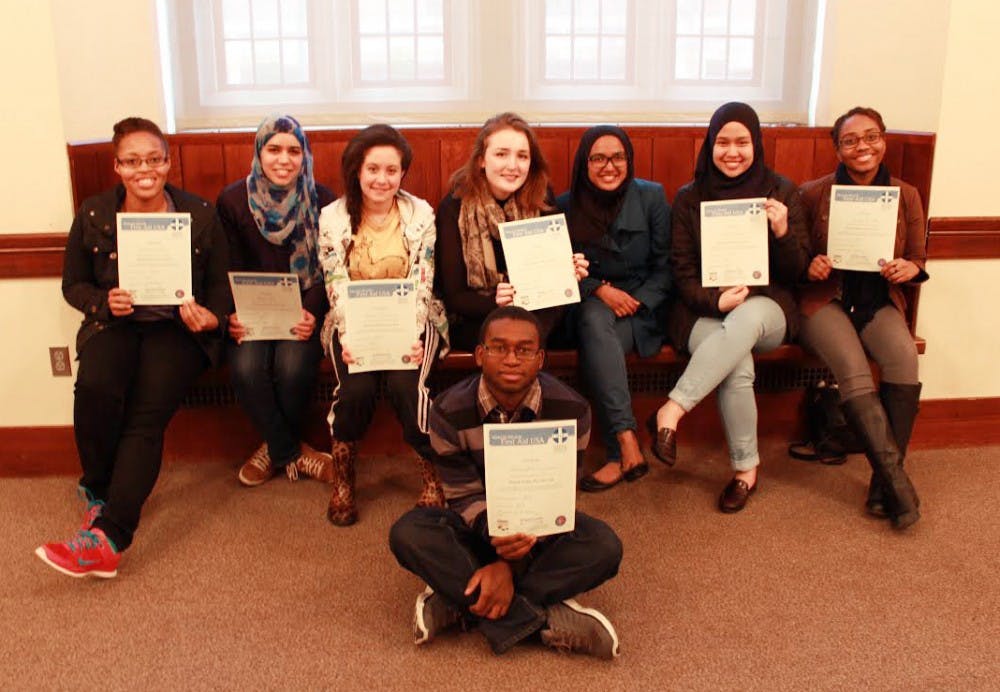
Kameelah Rashad , a 2001 Graduate School of Education graduate who mastered in counseling and psychology returned to Penn last January, in part, to improve mental health on campus through religion.
“As an alum and as someone who went to CAPS during my time as an undergrad student, I know how difficult it is to seek help in times of struggle,” said Rashad, also a 2000 College graduate who currently serves as a campus minister to the Muslim community. “But at some point, we reach our emotional max and we need a safe space to talk about our doubts, fears and insecurities. That’s why we’re here.”
In her position as Associate Chaplain and Muslim campus minister, Rashad often lends her ears and provides advice to Muslim and non-Muslim students. Recently, though, more students have begun to seek her counsel, especially for mental health- and stress-related matters.
Rashad’s experience is indicative of a larger movement in religious life at Penn: an increasing dialogue about mental health.
In the wake of three student suicides last semester, Counseling and Psychological Services hired more staff and expanded its hours. Penn President Amy Gutmann also commissioned a mental health task force in February to study student psychological well-being.
On a less publicized scale, though, Penn’s religious community has begun increasing its focus on mental health services. For example, adult leaders of religious groups are making their support and counseling services more public and accessible to students.
From his new, more-central office in Houston Hall, University Chaplain Chaz Howard has been promoting larger-scale change among campus ministers.
“The shift was in making sure that campus ministers were available for counseling so that, for instance, you would know the priest on campus was not only there to celebrate the Eucharist but also to be there for you if you need to talk,” said Howard, who also serves on the University’s mental health task force.
This can be especially useful in religious communities, Rashad said, where “the stigma can feel insurmountable.”
“Many students believe that if they have faith in God, if they are good Muslims or good Christians, then they should be able to get through this on their own,” Rashad said. “I hear this often in the Muslim community, that mental illness is an indication of weak faith or that is a punishment from God.”
That’s why she tries to get students to talk more about their problems. Rabbi Mike Uram and the staff at Hillel, many of whom are trained in social work, have also increasingly encouraged students to talk about their personal challenges.
This increased focus on mental health, however, is being sought by both adult and student religious leaders. Heads of groups like the Muslim Student Association, Hillel and the Hindu Student Council & Young Jains of America are helping lead the charge for more transparent conversations about mental health.
This semester, MSA President Menvekeh Daramay , a College senior, plans to hold a two-day mental health first-aid training and certification session in October under Rashad’s guidance. It will be open to all students who are willing to make the eight-hour commitment.
“The training equips you with information about signs and symptoms of common disorders and how to respond to someone in an emotional crisis,” Rashad explained. “It helps you connect that person to the support they need.”
Daramay and a few other MSA members were trained last year, and found it incredibly useful — Daramay now provides open office hours to anyone who needs to talk.
Hillel President Alon Krifcher , an Engineering senior, is also looking to provide more tangible events and resources throughout the year. “Our social justice task team is still at work to see what more can be done, but the most important thing we do is to emphasize that you can feel safe and supported at Hillel and provide space for students to talk through their feelings and ideas with staff members,” Krifcher said.
The Hindu Student Council & Young Jains of America promotes mental wellness at weekly “Spiritual Sundays,” which “include a meditation session with the goal of inner peace and resilience,” said the group’s Co-president, Wharton and College senior Neel Koyawala .
He said that following last semester’s mental wellness push — the group led an interfaith panel discussion on mental health and donated their earnings from Holi t-shirt sales to the national Active Minds group — the Hindu and Jain group will continue to expand its services.
The Daily Pennsylvanian is an independent, student-run newspaper. Please consider making a donation to support the coverage that shapes the University. Your generosity ensures a future of strong journalism at Penn.
DonatePlease note All comments are eligible for publication in The Daily Pennsylvanian.








